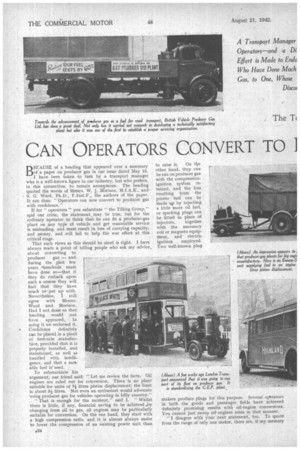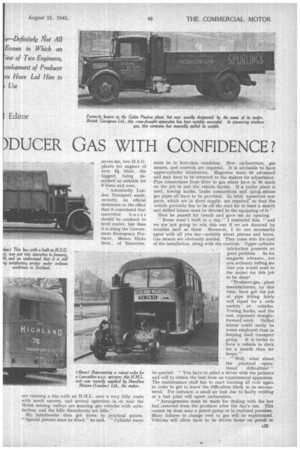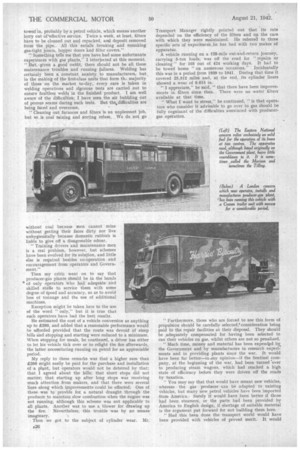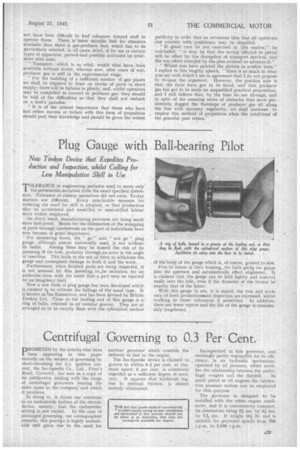CAN OPERATORS CONVERT TO DUCER GAS WITH CONFIDENCE?
Page 26

Page 27

Page 28

Page 31

If you've noticed an error in this article please click here to report it so we can fix it.
BECAUSE of a heading that appeared over a summary of a paper on producer gas in our•issue dated May 15, I have been taken to task by a transport manager who is a well-known figure in our industry, but who prefers, in this connection, to remain anonxmous. The heading quoted the words of Messrs. W. J. Morison, M.I.A.E.. and • S. G. Ward, Ph.D.; F.Inst.F.c the authors of the paper. It ran thus: "Operators can now convert to producer gas with confidence."
If for " operators " you substitute "the Tilling Group," said our critic, the statement, may be true, but for the ordinary operator to think that he can .fit a producer-gas plant on any type of vehicle and get reasonable service is misleading, and must result in loss of carrying capacity, and money, and fail to help the war effort at this critical stage.
That such views as this should be aired is right. I have always made a point of telling people who ask my advice, about converting to producer gas — and during the past few years 'hundreds must have done. so—that if they do embark upon such a course they will find that they have much toput up with.
Nevertheless, I still agree with Messrs. Ward and Morisbn.
Had I not done so that heading would not have appeared.. In using it we endorsed it.
'Confidence definitely can be placed in a plant
of first-rate _manufac ture, provided that it is properly installed, and maintained, as well as handled with intelligence, and that a suibable fuel is' used, To substantiate' his argument, our friend said: "Let me review the facts. Oil engines are ruled out for conversion. There is no plant suitable for units of 7i litres piston displacement; the limit is about 5* litres. Not even an enthusiast would advocate using producer gas for vehicles operating in hilly country."
"That is enough for the moment," said I. " Whilst there is little, if any, financial saving to be achieved Jay changing from oil to gas, oil engines may be particularly suitable for conversion. On the one hand, they start with a high compression ratio, and it is almost always easier to lower the compression of an existing power unit than to raise it. On tip other hand, they can be run on producer gas with the compressionignition system retained, and the loss resulting from the poorer fuel can be made u4a by injecting a little more oil fuel, or sparking plugs can be fitted in place of injectors, together with the necessary coil or magneto equipment, and electric ignition employed. Two well-known plug makers produce plugs for this purpose. Several orators in both the goods and passenger, fields have achieved definitely promising results with oil-engine conversions. You cannot just sweep oft engines aside in that manner.
" I disagree with your next statement,. too. To quote Irons the range of only one maker, there are, if my memory serves me, two H.S.G. plants for engines of over 5k litres, the biggest, being described as suitable for 8 litres and, over.
" Admittedly London Transport made, recently, an official statement to the effect that it considered that converted buses should be confined to level routes, but then it is using the Government Emergency Producer. Messrs. Hicks Bros., of 'Braintree, are running a buts with an H.M.L. over a very hilly route with much success, and several operators in or near the 'Welsh mining valleys are running gas vehicles with satisfaction, and the hills thereabouts are hills."
My interlocutor then got down to practical points. "Special pistons must be fitted," he said. "Cylinder bores
must be in first-class condition. New carburetters, gas mixers, and controls are required. It is advisable to have upper-cylinder lubricators. Magnetos must bt advanced and may have to be returned to the makers for adjustment. Pipe connections from filter to gas mixer have to lit made on the job to suit the vehicle layout. If a trailer plant is used, towing books, brake connections and quicy-release gas pipes all have to be provided. In brief, numerous new parts, which are in short supply, are required' so that the vehicle probably has to be off the road for at least a month and skilled labour must be devoted to the equipping of it."
Here he paused for breath and gave me an opening.
" Rome wasn't built in a day," I reminded him, "and we are not going to win .this war if we are daunted by troubles such as these. Moreover, I do not necessarily agree with all you say—notably about pistons and bores. Gas mixers are obviously needed. They come into the cost of the installation, along with the controls. Upper cylinder lubrication presents no great problem. As for magneto advance, are you seriously telling me that you would send to the maker for this job to be done?
"Producer-gas plant manufacturers, by this time, have got the job of pipe fitting fairly well taped for a wide variety of vehicles. Towing hooks, and the rest, represent straightforward work. Skilled labour could easily be worse employed than in keeping road transport
going. It is better to have a vehicle in dock for a month than for keeps.''
"Well, what about the practical opera
tional difficulties? " he queried. " You have to select a driver with the patience and will to obtain the best from an experimental apparatus. The maintenance staff has to start learning all over again in order to get to knoW the difficulties likely to be encountered. For instance, a small air leak due to faulty welding or a bad joint will upset carburation.
"Arrangements must be made for dealing with the hot fuel removed from the producer after the day's run. This cannot be done near a petrol pump or in enclosed premises. Many failures to change over to gas will be experienced. Vehicles will .of ten have to be driven home on petrol or
towed in, probably by a petrol vehicle, which means another lorry out of 'effective service. Twice a week, at least, filters have to be cleaned out and repacked, and deposit removed from the pipe. All this entails breaking and temaking gas-tight joints, hopper doors and filter covers."
"Something tells me that you have had some unfortunate experiences with gas plants," I interjected at this moment. " But, -given a good outfit, there should not be all these maintenance troubles and running failures. Welding has certainly been a constant anxiety to manufacturers, but in the making of the first-class units that form th.:, majority of those on the market to-day, every care is taken in welding operations and rigorous tests are carried out to ensure faultless welds in the finished product. I am well aware of the difficulties; I have seen the air bubbling out of porous seams during such tests. But thee difficulties are being faced and overcome.
"Cleaning out furnaces and filters is an unpleasant job, but so is coal mining and sorting refuse. We do not go without coal because men cannot mine without getting their faces dirty nor live unhygienically because domestic rubbish is liable to give off a disagreeable odour.
" Training drivers and maintenance men is a real problem, however, but schemes have been evolved for its solution, and little else is required besides co-operation and encouragement from operators and Government."
Then my critic went on to say that producer-gas plants should be in the hands of only operators who had adequate and skilled staffs to service them with some degree of 4peed and accuracy, so as to avoid loss of tonnage and the use of additional machines.
Exception might be taken here to the use of the word " only," but it is true that such operators have had the best results.
He estimated the cost of a vehicle conversion as anything up to £200, and added that a reasonable performance would he afforded provided that the route was devoid of steep hills and stopping and starting were reduced to a minimum. When stopping for meals, he continued, a driver has either to let his vehicle tick over or to relight the fire afterwards, the latter necessitating running on petrol for an appreciable period.
My reply to these remarks was that a higher sum than £200 might easily be paid for the purchase and installation of a plant, but operators would not be deterred by that; that I agreed about the hills; that short stops did not matter; that starting up after long stops was receiving much attention from makers, and that there were several lines along which ipiprovements could be effected. One of these was to provide for a natural draught through the producer to maintain slow combustion when the engine was not running, although this scheme was not applicable to all plants. Another was to use a blower for drawing up the fire. Nevertheless, this trouble was by no means imaginary.
Then we got to the subject of cylinder wear. Mr. Transport Manager rightly pointed out that its rate depended on the efficiency of the filters and on the care with which they were maintained. He referrea to three specific sets of experiences _he has had with two makes of apparatus. A vehicle running on a 128-mile out-and-return journey, carrying 5-ton loads, was off the road for "repairs or cleaning" for 105 out of 424 working days. It had to be towed home "on numerous occasions." Incidentally this was in a period from 1939 to 1941. During that time it covered 25,312 miles and, at the end, its cylinder liners showed a wear of 0.015 in.
" I appreciate," he said, "that there have been improvements in filters since then. There were no water filters available at that time.
" What I want to stress," he continued, "is that operators who consider it advisable to go over to gas should be fully cognizant of the difficulties associated with producergas operation.
" Furthermore, those who are forced to use this form of propulsion should be carefully selected,•consideration being paid to the repair facilities at their disposal. They should be adequately compensated for having been selected to run their vehicles on gas, whilst others are not so penalized.
" Much time, money and material has been expended by. the Government and by manufacturers in research experiments and in providing plants since the war. It would have been far better—in,4ny opinion—if the Sentinel company, at the beginning of the war, had been turned 'over to producing steam wagons, which had reached a high state of efficiency before they were driven off the roads by taxation.
" You may say that that would have meant new vehicles, whereas the gas 'producer can be adapted to existing vehicles, but many new petrol vehicles have been imported from America. Surely it would have been better if those had been steamers, or the parts had been provided by America to English design, if shortage of suitable material is the argument put forward for not building them here.
"Had this been done the transport world would have been provided with vehicles of proved merit. It would not have been difficult to find adequate trained staff to operate them. There is more suitable fuel for steamers available than there is gas-producer fuel, which has to be particularly selected, in all cases, dried, if for use in certain types of apparatus, packed.and possibly activated by treatment with soda.
" Transport, which is so ;vital, would then have been available without doubt, whereas now, after years of war, producer gas is still in the experimental stage. " For the building of a sufficient number of gas •plants we shall be required to draw on stocks of parts in short supply; there will be failures in plenty;, and, whilst operators may be compelled to convert to producer gas, they should be told of the difficulties so that they shall not embark on a fool's paradise.
" It is of the utmost importance that those who have had either success or failure with this form of propulsion should pool their knowledge and should be given the widest publicity in order that an erroneous idea that,a/1 operators can convert with confidence may bedispelled.
" If great care be not 'exercised in this matter," he concluded, " it may be that the saving effected in petrol will, be offset by the disruption of transport services, and the war effort retarded by the plan evolved to advance it."
" Whilst you have painted the picture in sombre hues." I replied to this lengthy speech,. " there is so much in what you say with which I am in agreement that I do not propose to re-open the argument. klowever, the position now is that the facts have got to be faced, and that producer gas has got to be made an unqualified practical proposition, and still believe that, by the 'time we. are through, and in spite of the amazing series of obstacles that have per. sistently dogged the footsteps of producer gas all along the line with uncanny regularity, we shall continue to employ this method of propulsion when the conditions' of the peaceful past return."




















































